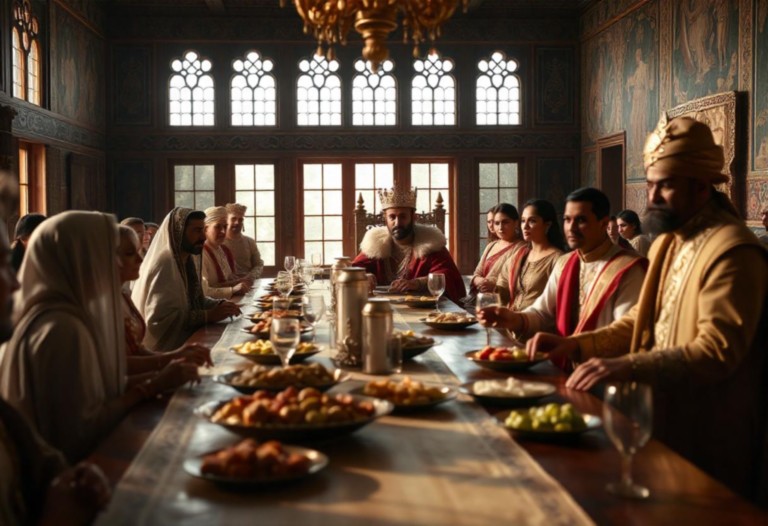The king's son gets marriedMatthew 22, 1-14

In this small story of a king hosting a lavish banquet on the occasion of his son's wedding, Jesus emphatically confirms that GOOD AND BAD ALIKE, EVERYONE GOES TO HEAVEN!
The King
The king's son is going to marry the most beautiful girl in the country. The father is overjoyed. The wedding will be grand. The king himself carefully prepares a sumptuous banquet, to which he has the pleasure of inviting all the great people of the kingdom along with their families and friends.
The "great people of the kingdom" are like the king's brothers. They are people of merit who have won wars for the kingdom. To reward them, the king has granted them glorious titles and vast tracts of land. Moreover, he has entrusted them with the most prestigious positions in his government.
However, these great dignitaries have no desire to attend this celebration. Certainly, they respect the king who has always protected their interests, but they hate his son.
Because this son, the same one who is about to get married, is an inexperienced and dreamy young man who believes he has the right to give lessons to his elders.
This son claims that the people are suffocating in the kingdom and that major changes are necessary. According to him, old traditions need to be shaken up, laws need to be relaxed, structures need to be rejuvenated and updated, and everyone, men and women alike, should be given the opportunity to grow and prosper.
It is necessary to change the mindset, to have vision, not to fear novelty, even to start everything over again so that the people can breathe and regain momentum.
This speech deeply offends the great lords. Considering themselves as the fathers, protectors, and benefactors of the country, they see in this young man nothing but contempt for their high dignity and rights.
They will not attend the wedding. They will boycott it. Inventing a thousand excuses, they inform the king that they "deeply regret" to inform him that they will not attend the celebration.
For the king, the blow is hard, but he bears it. He knows how attached the great lords are to their power. Many times, he had asked, even begged them, to seriously consider the need for profound changes, as the kingdom was falling apart. But each time, it was like talking to deaf people. Only the son understood.
"Since the great ones disdain my banquet," declares the king, "I will invite the little ones." Immediately, messengers are dispatched throughout the kingdom to announce to the common people (especially those who have nothing) that they are all expected at the grand banquet.
In no time, the vast halls of the palace are filled with a multicolored crowd of "bad and good." It is a sea of poor people (Luke 14, 21-23). It is delightful to see them eating and having fun. The king is in glory.
As the celebration reaches its peak, the king stands to speak. With great emotion, he announces that he has decided to entrust his beloved son with a historic mission. From now on, his son will promote in the kingdom all the necessary changes, some radical, so that each person in the country can finally enjoy a free, healthy, and truly human life as God intended.
The Son
The son accepts this mission with enthusiasm and immense gratitude. Unable to contain his enthusiasm, he announces a series of resolutions that fall like manna from heaven into the mouths and hearts of the guests. In summary, ten good news announcements are proclaimed that day:
• Out of pure kindness from my father and our King, I have the immense pleasure to announce that, from today, listen well, from today, all debts are forgiven. Immediately, the properties that were confiscated in the past are returned to their original owners.
• All forms of slavery, especially the most subtly disguised ones, are abolished forever.
• From now on, there will be no more talk of war, revenge, punishment, or violence, for all that belongs to the garbage heap of history.
• For this same reason, we also put an end today to the religion of the letter, of rigor, of fear, and all those exaggerated rules that do not honor God but make him a caricature of what He is.
• From now on, it is established that all the assets of the kingdom belong to the entire community. These assets will be periodically shared according to each person's needs until no one has too much and everyone has enough.
• From now on, the king gives all power to the people so that the people can take care of themselves and be responsible for their destiny.
• Now, we can sing: "Blessed are the poor!" because poverty has now been defeated!
• Now, we can sing: "Blessed are the men and women who hunger and thirst for justice," because they will never be disappointed again!
• Now, we can embrace the happiness we have longed for because by grounding our lives on the rock of respect, truth, and freedom, and by making compassion, solidarity, and justice our banner, we inaugurate today an era of peace that will have no end!
• Persecutions and crosses will not be lacking, but they will not stop us because we know that this is the path on which God walks with us, and we with him. The Kingdom of God is on the move!
The applause rains down, the ovations are endless. The toasts, cheers, and vows of loyalty to the king, his son, and God do not stop. In one voice, everyone embraces the wonderful alliance that is being sealed at these unforgettable weddings.
The Serpent
Meanwhile, a dark figure slips through the back door and sneaks into the palace like a serpent. He tries to go unnoticed, but his strange behavior betrays him. He casts suspicious glances everywhere. Perhaps he is a spy for the “dignitaries”… He looks more nervous than a fish in a muddy pond. He doesn’t touch any food, doesn’t speak to anyone. He cannot believe what his eyes are seeing.
He watches in horror as this king has allowed a hodgepodge of individuals of all kinds into his house, including some who do not look like saints. "This king has lost his mind!" he thinks. And what about the son's speech? Pure subversion! A declaration of war against the "pillars of the nation."
"This son must die!" he tells himself. At that very moment, for reasons known only to God, he has a seizure and drops dead.
To this day, such characters are still alive and very powerful. They are the ones who closed the windows of the Church that the Holy Spirit had opened at the Second Vatican Council. Through their intrigues, their class interests, their morbid traditionalism, their fanaticism, their petrified beliefs, and their paranoia elevated to a virtue, they once again distanced the Church from the world in which the great majority of women and men of this century continue to struggle and suffer as always. They do not accept that the Gospel is Good News for everyone. And so, by pretending to be the only ones with the right to enter the Kingdom, they exclude themselves from it (Matthew 23:14).
While the servants discreetly dispose of the unfortunate spy's corpse, the celebration continues at full speed for the greater pleasure of the king, his son, and all the revelers.
The Bride
By the way, who is this beautiful girl that the king's son married? Some say she is Utopia, others believe she is Madness. In reality, she is Wisdom, the same wisdom of God, who penetrates Creation to its roots and subtly guides it toward its full realization.
Wisdom has a power that surpasses that of light, water, and wind. It is neither dream nor fantasy. It is the very source of Reality. It is she who makes the flowers grow and the forests expand, who makes the Moon orbit the Earth and the Earth orbit the Sun. She moves mountains and raises the dead. It is she who gently awakens in human beings the sources of life still dormant, which could one day allow them to touch the stars.
It is Wisdom whom the king's son took as his wife. She is the queen of prophets and great poets and the one who inspired the ten good news announcements that came from his mouth.
End
What happened next, we already know. Wisdom was rejected, and the son was murdered.
It certainly wasn't the "bad" ones who came to the wedding and were moved by the son's words who killed him, but the "good" ones who boycotted the celebration.
Will this story ever have a happier ending?...

You can follow his writings on his personal blog:
